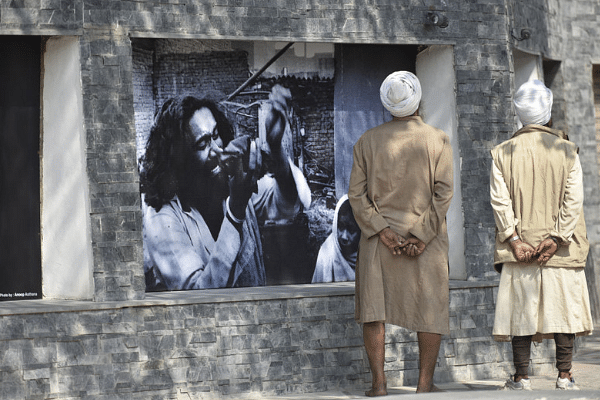
1984 Anti-Sikh Riots: The Wheels Of Justice Have Started To Turn
The call for justice for one of the largest persecutions in India’s postcolonial history was not heard for a long time, until recently, when the wheels of justice started to turn.
The old Indian adage of “tareekh pe tareekh (date after date)” has been a protagonist, tragically though, in the journey of the 1984 anti-Sikh riots.
What began initially as an angry outburst in the aftermath of the then prime minister’s assassination, soon turned into an organised carnage.
Thirty-four years ago, a mayhem broke out, with the scenes of burning streets, mass massacre in trains, screaming of children, and wailing of mothers turning the country into a battlefield, reminiscent of the partition days of 1947. In no time, the nation was engulfed in wrath, agony, and terror, which took the country to an abyss.
Numerous chronicles of the violence, which occurred mostly in Delhi, have been recorded since, depicting the trauma imposed by and betrayal of the then Congress government. The treachery of the party in power and mistrust in justice left survivors hopeless until 2014, when the Narendra Modi-led National Democratic Alliance (NDA) was sworn in.
The failure of successive Congress governments to prosecute those responsible for the killings and abuses during the 1984 anti-Sikh violence highlights that for them power reigns supreme.
Having no remorse for the slaughtering, Rajiv Gandhi remarked, while discounting the death of thousands, “When a big tree falls, the Earth is bound to shake.” This cringeworthy statement from the head of state clearly showed how serious the Congress government was in averting the entire pogrom.
What the Congress failed to do in 30 years, the Modi government did in three. The investigative authorities, which threatened, delayed, and discouraged people from even lodging a first information report (FIR), swiftly complied with the due process under the aegis of Narendra Modi. The pronouncement of the verdict and sentencing of the two accused came as a ray of hope for the Sikh community.
Yashpal Singh’s death punishment in the anti-Sikh riots is the first since 1996. Attempts are being made to book the others involved.
The miscarriage of justice began with the dismissal of the Marwah Commission, which was appointed in the aftermath of the massacre. Subsequently, many enquiry commissions were created and closed. Shockingly, the Ranganath Misra Commission recorded statements in private, in the absence of the victims, and absolved Rajiv Gandhi’s government of responsibility. In 1994, the case was closed by Delhi Police for want of evidence.
In an attempt to bring justice, the Vajpayee government instituted the Nanavati Commission in 2000. This report made public a lot of material that was shocking, wherein powerful leaders from the Congress were named. Some of them, like H K L Bhagat, has since died, without facing trial. Whereas, others like Sajjan Kumar, Jagdish Tytler, and Kamal Nath have gone scot free.
Although Tytler lost his ministry, and was exonerated by the Central Bureau of Investigation (CBI) amid protest in 2009, no justice was seen forthcoming. No trial against any of the accused, named by the investigative authorities, was done despite concrete evidence against them.
Ironically, Manmohan Singh apologised to the Sikhs in 2004, and, soon after, Tytler and Kumar were elected as members of Parliament that same year. The Congress made a mockery of the loss of life of 3,000 Sikhs with emotionally charged public apologies while not even an iota of determination was shown to crack down on the perpetrators. Even the investigative agency, CBI, gave them a clean chit in 2009.
Notwithstanding the complications of the case, for it is, after all, three decades old and, hence, the difficulty in collating and scrutinising records, the Bharatiya Janata Party (BJP) government took up the challenge, and all efforts were made to examine the cases minutely.
Fulfilling his promise to undo the damage and deliver justice, Prime Minister Modi directed the formation of a committee headed by G P Mathur on 23 December 2014 to suggest a way forward. In a matter of weeks, a Special Investigation Team (SIT) was set up to re-examine the cases, and finally, trial started in the fast-track court in 2015. The SIT accessed police stations and the files of previous committees, which had gathered evidence. Importantly, the team filed fresh charges where it found evidence.
While the investigation was underway, Kamal Nath, one of the accused in the 1984 riots, was rewarded by the Congress as he was appointed as the party president for the state of Madhya Pradesh in 2018.
The call for justice for one of the largest persecutions in India's postcolonial history was finally heard. The voices of victims and eyewitnesses in long-winded judicial processes, which was almost retired in exhaustion, were re-awakened by the recent Delhi court judgement.
The vacuum created by the loss of life of our Sikh brethren can’t be filled; the ordeal faced by the survivors can never fade away; but, surely, the souls of the deceased must be resting in peace today.